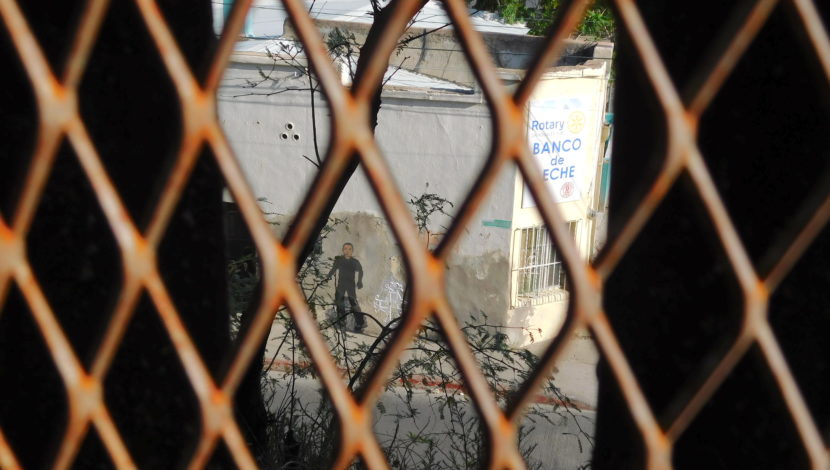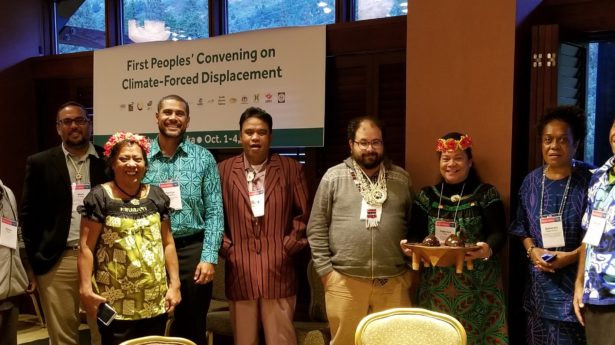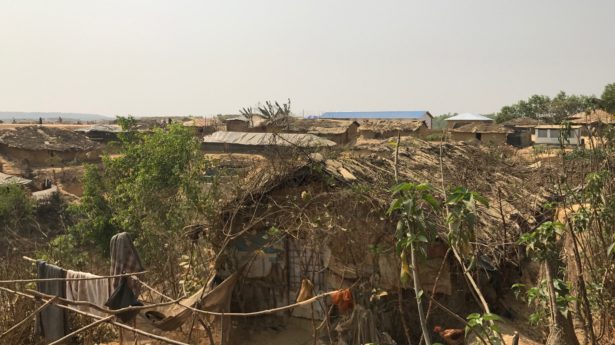The Unitarian Universalist Service Committee advances human rights through grassroots collaborations.
From Capitalism to Cooperation: Embracing the Right to Migrate

By Rachel Gore Freed on December 18, 2020
Header Photo: In Nogales, Arizona, a view beyond the border wall is a mural in memory of Jose Antonio Elena Rodriguez, a 16-year-old boy who was shot and killed by a US Border Patrol agent. The Border Patrol agent was later acquitted by a jury. Photo by Jennifer O’Rourke, UUSC staff.
Friday, December 18 is the United Nations’ International Migrants Day, a time to celebrate the human right to migrate and seek a better future for oneself. Through our domestic and international work, UUSC and its members are acutely aware of the harm experienced by many around the world through the act of forced displacement. Violence, political corruption, authoritarianism, corporate greed, and militarism, are just a few examples of the reasons why some are forced to migrate. We also know quite well that many countries build and maintain immigration systems that are harsh and highly xenophobic.
When we recognize that the root causes and historic injustices of U.S. foreign policy have created the global crises fueling rapid displacement today, we see the patterns of injustice that must be disrupted and dismantled both here at home and abroad.
We know we must rebuild the political will to dismantle systems of deportation, detention, and punishment that circumscribe the lives of migrants living in this nation. The Center for American Progress recently called for a more humane and effective approach to immigration enforcement noting that, “heavy-handed punitive enforcement is the only model of immigration enforcement Americans have seen across this country” and the result is, “detention and deportation are the only immigration enforcement tools most Americans know.” The horrifying result is that militarism, exploitation, and imperialism are tearing our communities apart—and they always have.
The challenge before us, however, is to take what we’ve learned about collective care during the pandemic and apply this knowledge to international relations. We must recognize our global interdependence and engage in multilateral cooperation and responsibility—particularly to address the harm this nation has caused. This requires an urgent and radical vision.
Grassroots Global Justice Alliance (GGJ), MADRE, and Women Cross DMZ are calling for a movement-driven framework that dramatically reimagines U.S. foreign policy; it is a model built on intersectional feminist principles and driven by social movements.
Feminist principles examine the root of the intersectional crises at play and envision alternatives rooted in an understanding of domestic conditions and foreign policy linkages. It means understanding our global interdependence and recognizing the need for cooperation, reckoning with our past harms, and valuing people and nature over profits while protecting those made most vulnerable by systemic injustice.
As MADRE notes; “The key to repairing international relationships, reimagining a more just diplomacy, and redirecting funds from the military’s $732 billion budget will be democratizing U.S. foreign policy so that women and historically marginalized communities most impacted by U.S. militarism are stakeholders in shaping future policies.”
The national security policies created after 9/11 are not making our communities secure. We are seeing increased surveillance of our communities with the diffuse data-sharing and subversive tactile military and border agent trainings. This approach connects the United States’ past repressive history with the militarized and authoritarian policies we’re seeing in other nations. Daily, people in power in these countries prioritize capitalism and global dominance over responsibility for the greater good.
In the past few weeks, our UUSC partners and allies have highlighted key issues arising from this:
- The government of Honduras has asked the U.S. government to designate temporary protected status (TPS) for migrants from Honduras residing in the United States in the wake of several storms that have caused humanitarian crises.
- The government of Greece moved 7,500 people to a refugee camp built on top of a firing range—soil that is most likely to have lead contamination.
- The Bangladesh government made plans to move 4,000 Rohingya refugees to a remote Bhasan Char island without United Nations technical protection assessments being conducted.
So how do we ensure that as people committed to upholding human rights, we do not let any person be treated as expendable?
It starts with providing humanitarian assistance in the form of temporary protected status for those who’ve lost everything in the recent hurricanes. It means providing due process and protecting the rights of those seeking freedom at our border. It means reuniting families and recognizing the value of immigrants—beyond what they can produce for little cost—to help heal from our extractive past.
It continues with a fundamental paradigm shift for U.S. foreign policy, starting with shifting funding from the Department of Homeland Security and the military to investing in communities and cooperative solutions led by women of color, Indigenous peoples, and queer and gender-nonconforming people. This work begins with asking who is at the decision-making table. UUSC’s approach to transformative change, working with our partners and allies to develop systems and policies based on collective care and accountability, will help move a progressive agenda forward that works towards the restoration and protection of all communities across the world.
***
About UUSC: Guided by the belief that all people have inherent worth and dignity, UUSC advances human rights globally by partnering with affected communities who are confronting injustice, mobilizing to challenge oppressive systems, and inspiring and sustaining spiritually grounded activism for justice. We invite you to join us in this journey toward realizing a better future!

